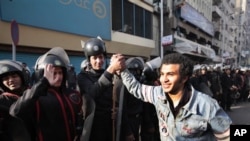Stephen Cook is an expert on Middle Eastern affairs for the Council on Foreign Relations based in Washington. Late Thursday he returned to Washington from Cairo and he discussed the causes of the demonstrations in Cairo and other cities with VOA's Paul Westpheling.
COOK: "This is the result of many years of pent up anger and frustration. There have been demonstrations going on in Egypt regularly throughout the last five or six years. It happens to be sparked by planned demonstrations on January 25 for police day and the Tunisian situation only gave those protests momentum and a sense among the protestors there was a real possibility that an Arab leader can be dislodged from office by people power."
Q: Why do these demonstrations seem to be gaining traction while other demonstrations have been short-lived and quickly ended by the government?
COOK: "I think the regime in Egypt was expecting that they would have one day of protests and everything would go back to the way it had been. Obviously the Tunisian situation, which occurred over an entire month, has taken hold of Egyptians who are seeking the same thing."
Q: There have been similar demonstrations against poverty, high unemployment and rising prices in Jordan, Yemen and we're seeing demonstrations in Lebanon. What has caused this sudden outpouring of protests?
COOK: "Let's just take Lebanon aside, because I think the situation in Lebanon is very Lebanon-specific. Across the region, like in Yemen, people are tired of authoritarian regimes and have disdain for their leaders. In Egypt, it is less about the economy - although there are economic grievances - but it is more a fact that people want to live in free societies."
Q: In Egypt, an outspoken critic of the government, Mohammed El Baradei, has returned. Is his presence fueling the anti-government protests?
COOK: "El Baradei's return is absolutely critical. If he can lead the this very disparate group of activists who have called the Egyptian people into the streets he can give this movement some political coherence and be a focal point for opposition to the regime and a focal point for reform and change which presents a very significant challenge to the regime which has suggested that this was inspired by the Muslim Brotherhood and it is going to be harder for them to garner the support of the United States when they're [the government] cracking down on a movement led by a secular lawyer who's calling for reform. It's a very significant development that he returned to Egypt."
Q: Would it be fair to say that the United States finds itself caught between support for Egyptian President Hosni Mubarak and the protesters?
COOK: "I think for the [Obama] administration this is much more difficult for them than it was in Tunisia, but at some point principle has to come into play here. The way in which the State Department, in particular, first handled this situation has been underwhelming. Urging restraint by all parties when clearly only one party is not using restraint and calling for reform seems irrelevant at this point."




